Referral Letter Template
[Your Name]
[Your Title/Position]
[Your Organization/Institution]
[Your Contact Information]
[Date]
[Recipient's Name]
[Recipient's Title/Position]
[Recipient's Organization/Institution]
[Recipient's Address]
Dear [Recipient's Name],
I am writing to provide a strong recommendation for [Referral's Name], who is seeking [employment opportunity/educational opportunity/etc.] within [industry/field]. I have had the privilege of working closely with [Referral's Name] for [duration of your professional relationship], and I am confident in their abilities and potential.
[Provide a brief introduction about your relationship with the individual. Mention how you know them, in what capacity you have worked together, and any notable projects or achievements you were involved in together.]
I have been consistently impressed by [Referral's Name]'s [list specific qualities, skills, and attributes that make them stand out, such as professionalism, technical expertise, creativity, leadership abilities, etc.]. Their dedication to [mention any relevant accomplishments, initiatives, or projects] truly sets them apart.
In addition to their impressive professional skills, [Referral's Name] possesses outstanding interpersonal qualities. They are an excellent communicator, able to convey complex ideas clearly and work effectively within teams. Their positive attitude and willingness to take on challenges make them a pleasure to collaborate with.
I have no doubt that [Referral's Name] will make a valuable contribution to any team or endeavor they choose to be a part of. Their passion for [industry/field] and their commitment to continuous learning and growth ensure that they will excel in any environment.
I highly recommend [Referral's Name] for [specific opportunity they are seeking], and I am confident that they will thrive and exceed expectations. If you have any further questions or require additional information, please do not hesitate to contact me at [your contact information].
Thank you for considering [Referral's Name] for [opportunity]. I am certain that they will bring the same level of dedication and excellence to this new chapter as they have to their previous endeavors.
Sincerely,
[Your Name]
[Your Title/Position]
[Your Organization/Institution]
[Your Contact Information]
Professional Referral Letter for Job Candidate
Subject: Referral for [Candidate Name]
Dear [Hiring Manager Name],
I am pleased to recommend [Candidate Name] for the [Job Title] position at your organization. Having worked closely with [Candidate Name] for [Duration], I have witnessed exceptional skills in [specific skills] and a strong work ethic. I am confident that [he/she/they] will be a valuable asset to your team.
Please feel free to contact me at [Phone Number] or [Email Address] for any further information.
Sincerely,
[Your Name]
[Position]
[Date]
Casual Referral Email for Freelance Services
Subject: Referral for [Freelancer Name]
Hi [Recipient Name],
I wanted to recommend [Freelancer Name] for your upcoming project. [He/She/They] have amazing skills in [Skill Area] and have worked with me on several projects with great results. I’m confident [he/she/they] can deliver high-quality work for you.
Best regards,
[Your Name]
Formal Referral Letter for Academic Purposes
Subject: Recommendation for [Student Name]
Dear [Admissions Committee/Professor Name],
I am writing to formally recommend [Student Name] for admission into [Program/University Name]. [He/She/They] have demonstrated exceptional academic performance, leadership skills, and dedication to [Field/Subject]. I firmly believe [he/she/they] will excel in your program and contribute positively to your academic community.
Sincerely,
[Your Name]
[Position/Title]
[Institution]
[Date]
Quick Referral Note for Local Services
Subject: Referral for [Service Provider Name]
Hello [Recipient Name],
I’d like to refer [Service Provider Name] for [specific service]. They are reliable, efficient, and highly skilled in their field. You can contact them at [Contact Info] for more details.
Thanks,
[Your Name]
Heartfelt Referral Letter for Volunteering
Subject: Referral for Volunteer Position
Dear [Organization Name],
I am delighted to refer [Candidate Name] for a volunteer position at your organization. [He/She/They] possess remarkable dedication, empathy, and organizational skills that will benefit your team immensely. I am confident [he/she/they] will make a positive impact on your programs and the community.
Warm regards,
[Your Name]
[Date]
Serious Referral Letter for Medical Specialist
Subject: Referral for [Patient Name]
Dear [Specialist Name],
I am referring [Patient Name] for consultation regarding [Medical Condition]. [He/She/They] have been under my care for [Duration], and I believe your expertise in [Specialty] will provide the necessary assessment and treatment. Kindly find attached relevant medical records for your reference.
Thank you for your assistance.
Sincerely,
[Your Name]
[Title]
[Institution/Clinic]
[Date]
Creative Referral Letter for Networking Purposes
Subject: Introduction and Referral for [Person Name]
Hi [Recipient Name],
I wanted to introduce you to [Person Name], an expert in [Field]. [He/She/They] have accomplished remarkable work in [Specific Achievement] and I thought connecting you both could lead to mutually beneficial opportunities. Feel free to reach out to [Person Name] at [Contact Info].
Best,
[Your Name]
What a Referral Letter Is and Why You Might Need One
A referral letter is a formal or informal document recommending a person, service, or professional to another party.
Its purpose is to vouch for skills, experience, or credibility, helping the recipient make an informed decision.
Referral letters are used in professional, academic, medical, volunteer, or service-based contexts.
Who Should Send a Referral Letter
- Professionals recommending colleagues or employees.
- Teachers or mentors recommending students.
- Medical practitioners referring patients to specialists.
- Individuals endorsing services, freelancers, or volunteers.
Whom the Referral Letter Should Be Addressed To
- Hiring managers, HR departments, or recruiters for job referrals.
- Academic committees or professors for student recommendations.
- Organizations or NGOs for volunteer referrals.
- Clients or potential clients for service referrals.
- Specialists or consultants for medical or professional referrals.
When to Write a Referral Letter
- When someone requests a recommendation for employment, academic admission, or volunteer work.
- When referring a patient to a medical specialist.
- When endorsing services or a professional to a prospective client.
- When networking or creating professional introductions.
How to Write and Send a Referral Letter
- Identify the purpose and recipient of the letter.
- Gather accurate details about the person or service being referred.
- Include specific achievements, skills, or experiences.
- Maintain an appropriate tone: formal for professional or academic, casual for personal or networking.
- Sign and date the letter, and choose the proper delivery method: email, printed letter, or internal memo.
Requirements and Prerequisites Before Writing a Referral Letter
- Confirm that the person or service consents to being referred.
- Collect details about qualifications, skills, or previous work.
- Understand the recipient’s expectations or criteria.
- Prepare any supporting documents or records if needed (resumes, certificates, medical records).
Formatting Guidelines for Referral Letters
- Length: 1–2 paragraphs for brief referrals; up to one page for detailed recommendations.
- Tone: professional, formal, or serious depending on context.
- Clarity: mention names, positions, dates, and relevant skills.
- Include subject line for emails.
- Sign with your full name, position, and contact information.
Elements and Structure of a Referral Letter
- Subject line or opening statement.
- Salutation/greeting.
- Introduction: relationship to the person being referred.
- Body: reasons for recommendation, specific skills or experiences.
- Closing: offer of further contact for queries.
- Signature, title, and date.
- Optional attachments: resumes, certificates, medical reports.
Tricks and Tips for Writing an Effective Referral Letter
- Be specific with examples of skills or achievements.
- Tailor each letter to the recipient’s needs.
- Use a clear, professional, and concise tone.
- Keep digital copies for future reference.
- Offer your availability for follow-up or questions.
Common Mistakes to Avoid in Referral Letters
- Providing vague or generic recommendations.
- Recommending without the person’s consent.
- Forgetting to include contact information.
- Writing excessively long or irrelevant content.
- Using an inappropriate tone for the situation.
After Sending a Referral Letter
- Confirm receipt with the recipient if necessary.
- Be prepared to answer follow-up questions or provide additional details.
- Keep a copy for your records.
- Notify the referred person about the referral.
Does a Referral Letter Require Attestation or Authorization?
- Usually, standard referrals do not require attestation.
- In some legal, medical, or academic contexts, a signature on official letterhead or notarization may be required.
- Always verify requirements specific to the recipient or organization.

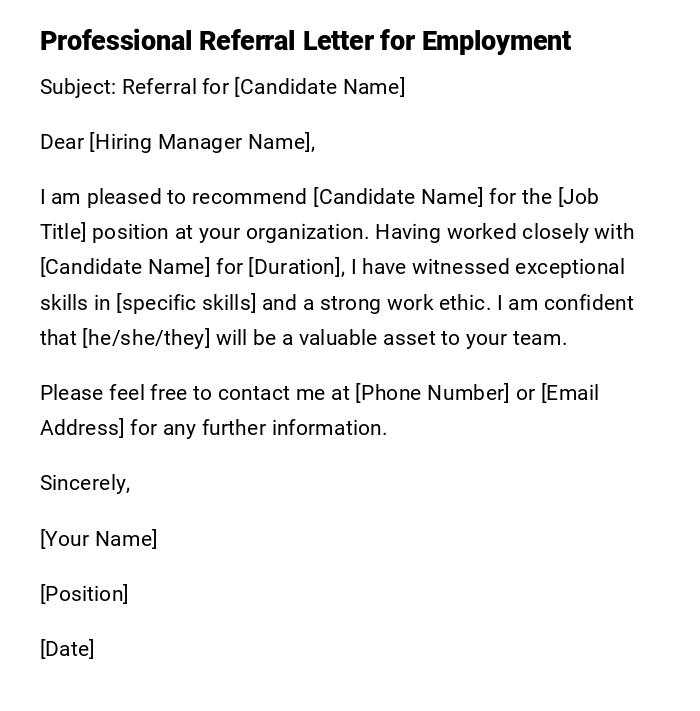
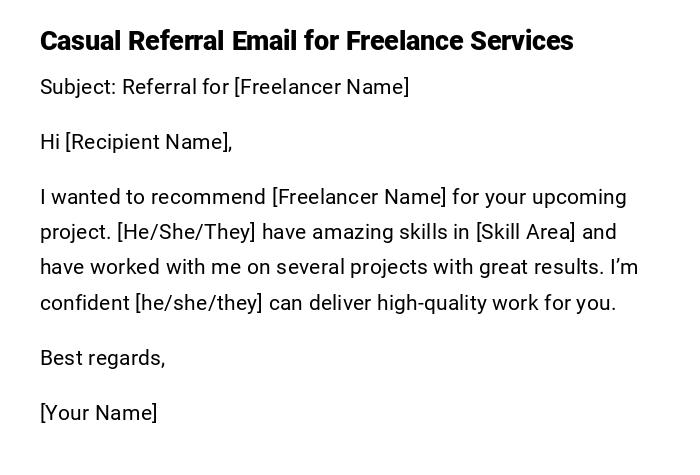
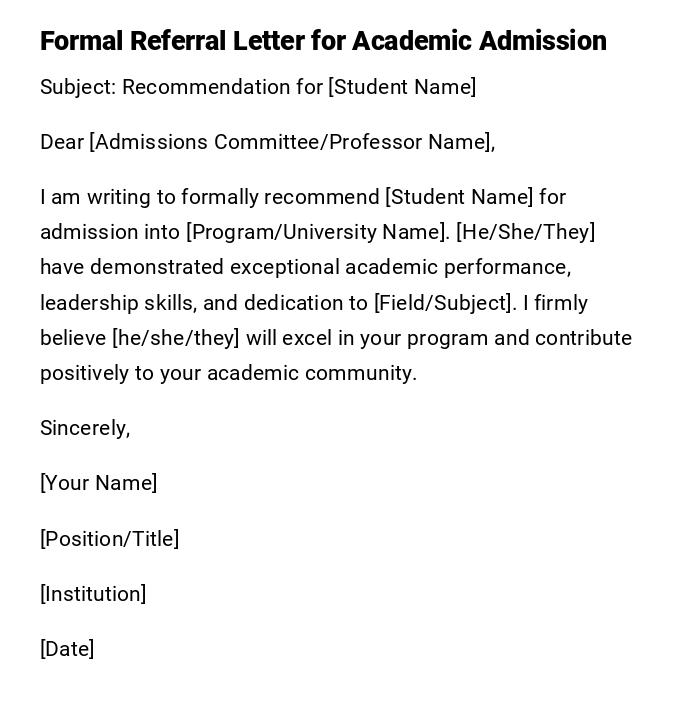
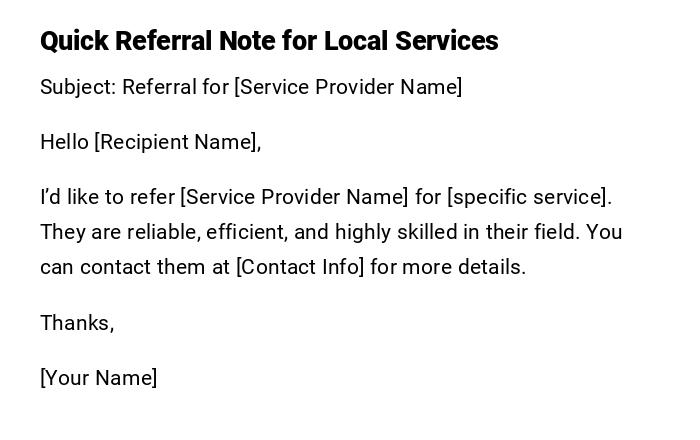
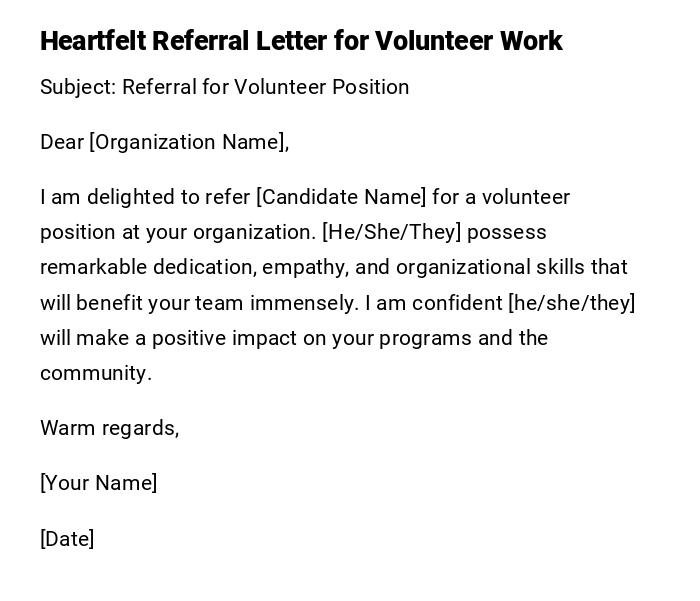
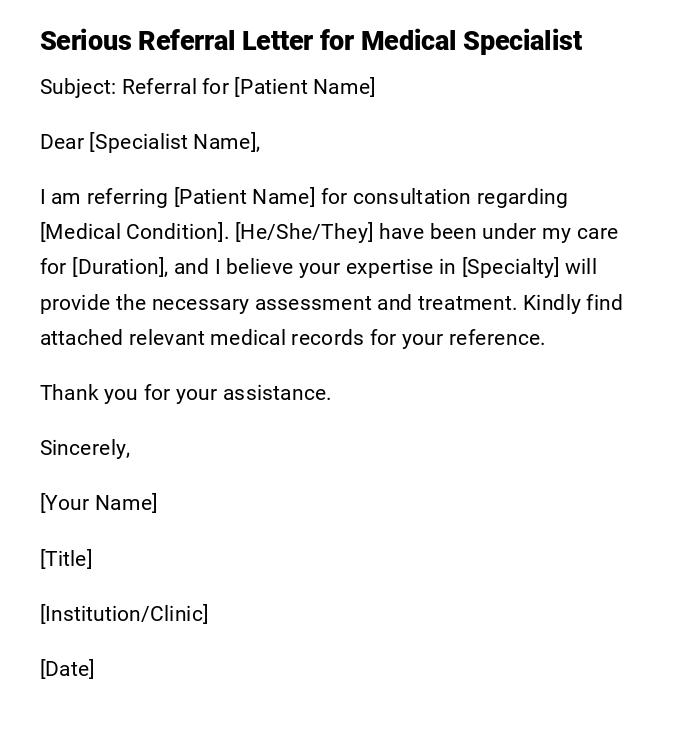
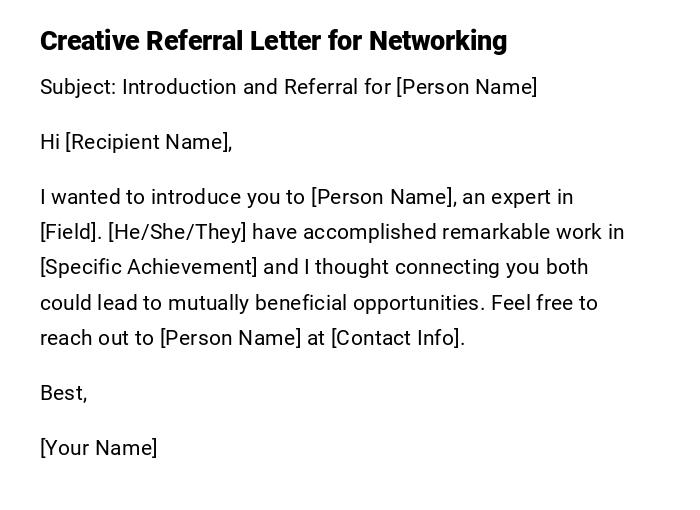
Business Referral Letter
Client Or Customer Referral Letter
Customer Referral Program Letter
Employee Or Employment Job Referral Letter
Employee Referral Cover Letter
Medical Referral Letter
Referral Cover Letter
Referral Letter For A Friend
Sales Referral Letter
Tenant Referral Letter
Thank You Letter For Referral

 Download Word Doc
Download Word Doc
 Download PDF
Download PDF